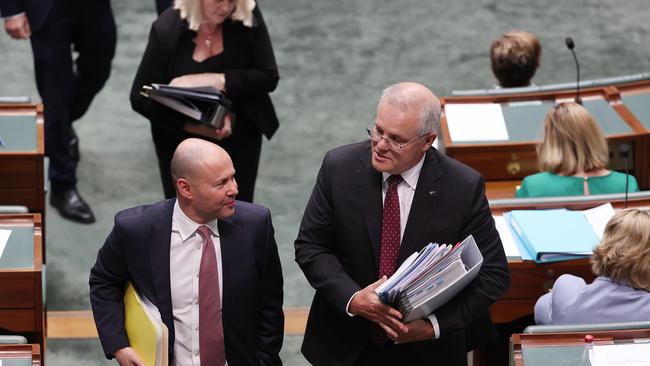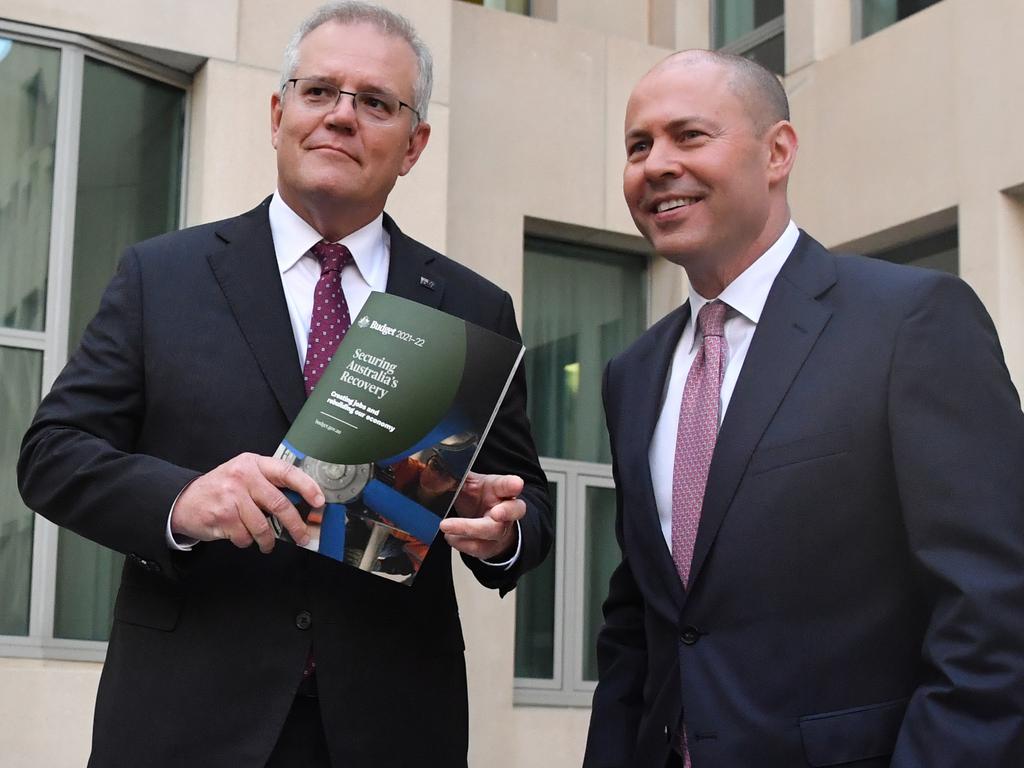As Coalition proves, good government adapts to challenges
Those who criticise the Morrison government for being too Labor or not sufficiently Liberal have never had to take big decisions.

Sure, this saying often has been evoked by individuals who seek a rationalisation for altering their views when they discover one position is more correct than another. But there are occasions when only a fool would fail to change to adopt to new circumstances.
In the wake of Tuesday’s budget, sections of the left and right have criticised Scott Morrison and Josh Frydenberg for abandoning the Coalition’s traditional opposition to debt and deficit. Critics on the centre-right lambaste the Morrison government for a failure of policy; those on the centre-left allege hypocrisy. Both are unfair.
In the past century there have been around five events that had a dramatic and immediate global impact of massive proportions — namely, the outbreak of World War I in 1914, the Spanish flu pandemic of 1918, the Depression of 1931, World War II in 1939-45 and the COVID-19 pandemic.
None of these events was anticipated, although preparations were made in some nations concerning a possible outbreak of hostilities in 1914 and 1939. Depressions and pandemics are harder to predict than wars, it seems.
In the current debate some commentators like to remind the Coalition about its criticism of the spending by the Labor government led by Kevin Rudd in the wake of the global financial crisis of 2008 to 2009.
Attempts have been made to ridicule Frydenberg’s “back-in-the-black” pronouncement when he brought down the April 2019 budget, in the light of his projected deficit for this year of $161bn.
However, the two events are not comparable. As the Treasurer said on ABC Radio National Breakfast on Wednesday: “During the GFC the global economy shrank by just 0.1 per cent; during the last year, the global economy shrank by a full 3.3 per cent.”
This is a massive difference. Moreover, the GFC was primarily a recession of Europe and North America — the Americans called it the Great Recession. For the most part, the nations of the Asia Pacific did relatively well during this time.
But COVID-19 has adversely affected nearly all nations.
Critics of the Morrison government like to call this year’s budget a Labor budget, while others say it’s not a Liberal budget. It’s unclear what this means.
The Liberal Party was founded in late 1944 and first came to office in December 1949. Since then there have been eight Liberal Party prime ministers leading a Liberal-Nationals Coalition government — namely, Robert Menzies, Harold Holt, John Gorton, William McMahon, Malcolm Fraser, John Howard, Tony Abbott and Malcolm Turnbull.
Not one experienced the economic crisis that befell Morrison and his colleagues early last year.
As Frydenberg put it in his budget speech: “We have come so far since the height of the pandemic. Treasury feared unemployment could reach 15 per cent and the economy could contract by more than 20 per cent. This would have meant two million Australians unemployed.”
It’s notable that those on the centre-right who dismiss the Morrison government’s response to the COVID-19 recession do not say what they would have done in response to the pandemic.
It’s meaningless for anyone to project what the likes of Menzies would have done if faced with such a crisis since he is long dead and circumstances have changed. But we do know that Howard told Frydenberg that, in his view, ideology has no place at the time of national or international crisis.
Menzies had a similar view. When prime minister, as head of the United Australia Party government in 1939, he increased both expenditure and the role of government to respond to the challenges of the early years of World War II.
Those who claim that this year’s budget is a Labor budget, overlook the fact the most successful Labor government — that headed by Bob Hawke and later Paul Keating between March 1983 and March 1996 — was not into high levels of expenditure and borrowing leading to debt and deficit.
Australia’s three longest serving prime ministers in chronological order — Menzies, Hawke and Howard — all responded responsibly to the national and international circumstances with which they had to deal.
This is what Morrison and his Liberal and National colleagues are doing today. The only difference is that no government in Australia since the Depression of 90 years ago has faced such a difficult economic challenge.
Right now, there’s probably no better place to be in the world than Australia, viewed in terms of Australia’s relatively strong economy and relatively low level of COVID-19 infection. Also, compared with prosperous nations such as Britain and the US, Australia has significantly lower net debt as a share of the economy.
Most of those commentators who criticise the Morrison government for being too Labor or not sufficiently Liberal have never had to take decisions in government or elsewhere which affect the livelihood of millions of others.
They are under an obligation to say what they would have done to minimise the number of Australians whose jobs and businesses were adversely affected by the COVID-19 recession.
For centre-right commentators who are critical of the Morrison government’s response to the pandemic there is another point. There will be an election within a year. The contest will be between the Coalition and Labor — or, possibly, the Labor Party supported by the Greens. There is no alternative outcome.
Any drift away from the Coalition to the right-of-centre minority party could see votes lost in the distribution of preferences. And any prevailing view that the government is the same as the opposition could lead to Labor gaining support.
The reality is that Australia’s going OK now and the future looks relatively good.
That’s primarily because the Coalition altered its approach to handle changing economic and health circumstances.
Gerard Henderson is executive director of the Sydney Institute.







British economist John Maynard Keynes is claimed to have said: “When events change, I change my mind; what do you do?” Or it may have been American economist Paul Samuelson. Or maybe neither of the above. But there is plausibility in the idea, whatever its source.